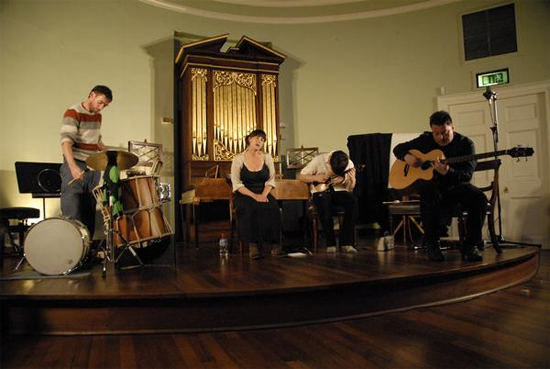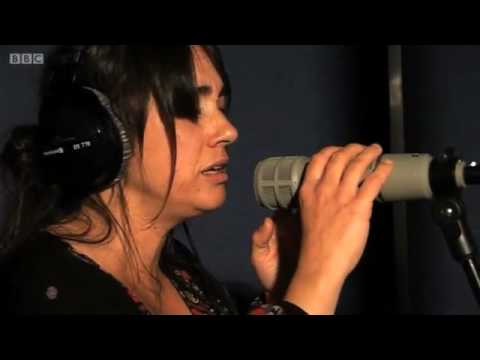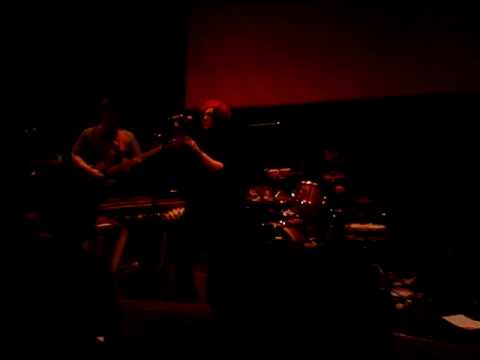A Glasgow four-piece consisting of a Basque singer, a Welsh violinist, a bassist from Bolton, and a puppeteer on drums, Tattie Toes have never subscribed to conventional notions of what a band should be. As a result, they’ve become one of the UK’s most inspiring underground acts, their songs combining Basque, Balkan and Scottish folk with post-punk and free improvisation. After five years of remarkable live shows, their debut album Turnip Famine has finally arrived on gloriously wonky Leicester label Pickled Egg.
A ravishing leap into the unknown, it has been well worth the wait. Nerea Bello’s vocals are a marvel; beautiful, freakish and occasionally theatrical. Her parts range from sweetest of Japanese lullabies to the most demonic of growls, taking in dramatic balladry and lusty folk dances en route. Rafe Fitzpatrick’s violin reels through folk forms and free-jazz, the missing link between Scottish fiddle legend Aly Bain and Albert Ayler sideman Michel Sampson. The rhythm section of Howie Reeve and Shane Connolly filter febrile Minutemen grooves through dub, jazz and the ritualistic rumble of Taiko drumming. A heady brew indeed.
The Quietus met up with Tattie Toes shortly after their set at Music Is The Music Language, a two day festival of local acts organised by Glasgow’s finest promoters Cry Parrot and Tracer Trails. Recently, the more commercial end of Scottish indie has been characterised by bearded young men peddling mopey anthems, but dig a little deeper and you’ll find an underground scene that has arguably never been in such rude health. A can-do spirit, combined with an openness to different sounds and styles, prevails. Punk, noise and metal rub shoulders with folk, improv and the latest electronic mutations. While led by young musicians, artists and promoters, the scene has benefitted from the inspiration and support of an older generation of DIY and clubbing veterans.
Tattie Toes are part of this continuum, children of Ron Johnson Records, inspired by the scratchy avant-punk of The Ex, Dog Faced Hermans and biG fLAME. Tracing their family tree takes us deep into the tangled roots of the early ’90s post-hardcore underground. Bassist Howie Reeve was a member of Maxton Grainger, and both he and drummer Shane Connolly have been involved in projects with members of the unjustly neglected Dawson. Currently, Shane also plays with experimental chamber troupe One Ensemble, and he and violist Rafe Fitzpatrick are both members of Alasdair Roberts’ band. These projects, combined with day jobs and family commitments, ensure that Tattie Toes is not a full-time concern. That approach suits them, however, all these other experiences feeding back into the band. “We love each other very much!” beams Nerea. This friendship comes through in the good humour and easy flow of their conversation.
So, how did Tattie Toes begin?
Howie Reeve: Shane saw me play in Shlebie [a band featuring Jer Reid and Robbie McKendrick of Dawson, and writer and musician Luke Sutherland].
Shane Connolly: We just thought we should hook up and try something, so we did that for a few months. Howie always wanted to work with Nerea and I’d been involved with Nerea in another project, and also with Rafe, so the connection was there.
Nerea Bello: I played with a band, it was a kind of afrobeat, Santana. It was good fun, but it was just backing vocals. Then I played in a band called Krakatit with Shane. After four weeks of playing we toured Germany!
SC: The guy that formed Krakatit – Heinz Ratz – came to live here to form a band and take it to Germany. It was his project. He’s now really successful in Germany with a band called Strom Und Wasser. We learned a lot from him, he was quite adventurous. It was a punk cabaret sort of thing. It wasn’t a million miles away from what Tattie Toes do. He was really interested in weird time signatures, that was the key to it really. I hadn’t really explored much of that before.
HR: The way that we’ve developed, and hopefully continue to develop, is that we’ve generally been open to each other’s different approaches. I really like the way that I’ve changed because I’ve been playing with these people. I’m more excited about what I don’t know than what I can already do.
SC: We’ve grown up a lot as well. A lot of things have happened, like Nerea’s children. A lot of responsibilities.
HR: The band is defined in many ways by our outside lives.
Rafe Fitzpatrick: I played with Shane in ’96 when I first moved to Glasgow. We were in a band called Mongrel Puppy for a couple of years, then we did improv stuff in the early 2000s.
Did you already have the songs in place when Rafe joined?
HR: We just about had some pieces and needed something else. Rafe came and did it all.
SC: You’d think that we should bring in a guitarist, but we all knew that we wanted to stay away from that as much as we could, try something different. We auditioned a couple of guitarists but I think we always knew it wasn’t a guitar we were after.
HR: We had a couple who played high notes, ‘Parisian Walkways’ stuff!
What’s the process of putting a Tattie Toes song together like?
RF: It’s either really fast or really long. We tend to throw things together quite quickly for gigs, like that piece we did at Doune the Rabbit Hole [an independent festival near Stirling] where we were all singing. We’ve probably a set’s worth of stuff that we’ve just done once or twice in gigs and never fully worked through. And then there’s the longer ones that take up to a year to write.
HR: One of the reasons they take a while is that we don’t get together that much. It is a frustration, I’ll not deny or pretend.
SC: With that said, we do pretty well. We’ve got loads of stuff that’s been recorded, so we just need to revisit them and find things to put together.
HR: There’s no one way of writing. It’s important that it’s not too conscious a decision. I think my songwriting’s got better, because I had a short attention span. The parts I write, it’s Nerea’s lyric that ties it together as a song. There’s nothing wrong with a bit of continuity. I remember Shane using the example of there being some bands who put one extention cable onto another, it’s not really connected, just a 30 second chunk, a two minute chunk. It’s not that thoughtful, that. Tune and melody really matter to us. Shane and me especially, we’re really rhythmically based, but it has to be good to listen to.
I don’t think what we do is particularly strange. We’re not a commercial prospect, so people come to us for the love. Like the Pickled Egg record label, the guy just loves our music, it’s not a question of making money out of us. He’s just a real fan. A lot of the things that have come our way are on those terms, on our terms really. It’s important to be alive and creative in that way.
Perhaps we could talk about some of your other projects? Shane also plays with guitarist Jer Reid in Issho Taiko Drummers, for example.
SC: I played taiko professionally for a few years, but I just knew that I didn’t want to go down that purist route. I always wanted to collaborate with other musicians and different types of instruments. We did a one off gig with Jer one evening, a band I had with Jer Reid and Stevie Jones called Sycamore – we’re about to release through Hubbie’s [Chemikal Underground guitar maestro, RM Hubbert] Ubisano label. We introduced the taiko at the very last moment and Jer was saying we should do more of this and it’s grown from there. I’m really lucky to have that, One Ensemble, Ali [Roberts] and that… Nerea, do you want to say something about Canna House?
N: Basically the reason I’m in Scotland is purely because my grandfather’s best friend was a folklorist, John Lorne Campbell. He and his wife, Margaret Fay Shaw, were recording songs and stories since the 1930s. They lived on Canna, south of Uist. And that’s funny, because now I’m doing a project with Hanna Tuulikki [of Two Wings and Nalle]. She’s doing research and a lot of the stuff she’s finding is recorded by my near-grandfather. The circle is just amazing. And I’m singing in Gaelic. It’s lovely.
HR: It’s so healthy right now. I’m doing quite a bit of stuff with Drew Wright [aka Wounded Knee] and that’s bearing through. We’ve been collaborating with young people in the community, trying to take our music there.
Do you think this feeds back into the band?
RF: It all comes round. What Howie was saying earlier, about what you don’t know rather than what you do, that goes for all of us.
HR: It’s important to play with that kind of generosity of spirit, and the way that people react to us – even when we don’t play that well, or I don’t play that well – people pick up a warmth from it. The accessibility part of it is really, really important. We’re not trying to be more different than thou, we kind of hate that. The whole inclusiveness and lack of cliqueiness in this current scene, we all believe in that very much. It’s really empowering when there’s no overaching commercial concern and you’re not sponsored by somebody. It’s just about the people. In this climate we need it more than ever.




